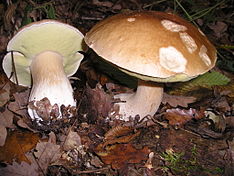
I’ve been doing a lot of things, some of them useful, others stressful–for example, trying to learn German in 3 1/2 weeks–in preparation for my upcoming trip to Vienna.
Freudian Food
Among the useful ones: Having the book Zu Tisch du Sigmund Freud, by Katja Behling-Fischer–At Sigmund Freud’s Table: Lifestyle, Hospitality and Eating Habits of the Founder of Psychoanalysis–translated. I figure if I am to follow in Freud’s footsteps in Vienna and re-create my family’s milieu, I need to know what he, and they, ate.
As I often say about being a food writer, it’s a tough job but somebody’s got to do it.

Freud had very strong opinions about food, as he did about most things. He hated cauliflower and chicken, to the point that he tried to avoid accepting invitations to dinner at houses where those foods might be served (he made exceptions for people he really, really liked, however).
He loved mushrooms, and he enjoyed foraging for them. Martha, Freud’s wife, didn’t especially trust his poison detection skills. She preferred buying her mushrooms at the market.
According to Behling-Fischer, the only thing husband and wife ever argued about was whether porcini mushrooms should be eaten with or without stems. (I find this hard to believe, but can’t contest it.) Frustratingly, the author doesn’t say who took which side in the debate. I’m guessing Sigmund was for stems, Martha against, based on the notion that poison might be concentrated there. If Sigmund picked something that looked like a porcini mushroom but wasn’t, it might be slightly safer to eat.
Speaking of Mushrooms
Another thing I did in preparation for my trip was write to the many relatives whose acquaintance I made since I started blogging, asking if they wanted me to look up anyone or visit any family sites while I was in Vienna.
What does this have to do with mushrooms you ask? Schmerling means greasy mushrooms. Or loach fish (see Fish, Fungi, and Funny Jewish Words: The Schmerling Name, Revisited).
Happy Birthday, Sigmund.

Ha! Only you can find a link between mushrooms and cats, that also holds 🙂
I wonder about the book title, German is so difficult, is it not “Zum” tisch, and “bei” Sigmund? Guess I am getting rusty with my German! (either way Germans – Austrians – will understand what you mean)
I am embarrassed at how little German I know. I can only tell you that this is the title that the translator I hired to go through the book came up with and she is fluent. Perhaps she was being idiomatic/colloquial in her translation?
Ah right, of course. I misunderstood it!
Thank you for another amazing fact about mushroom and hoe it is somehow related to Freud. This is a very good article.